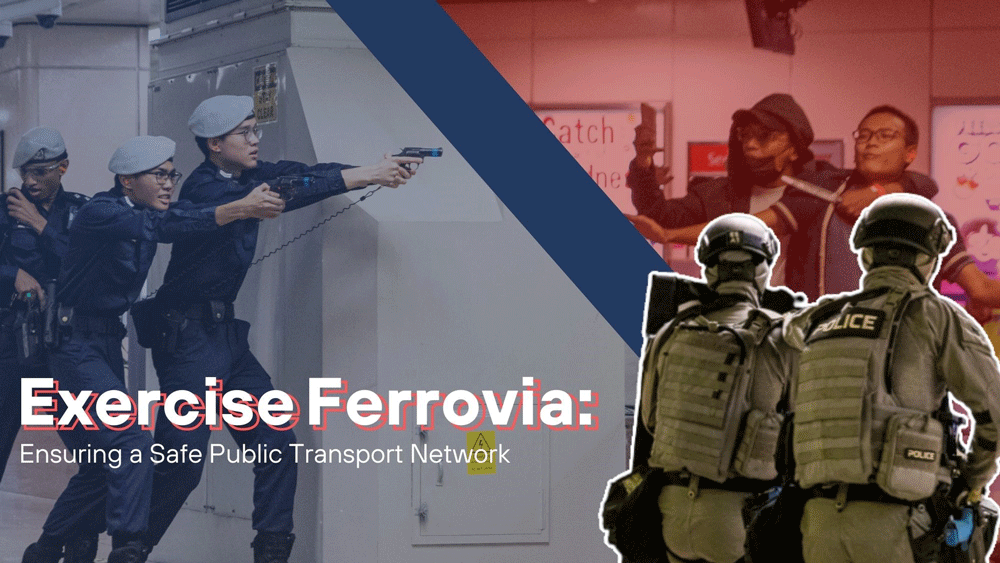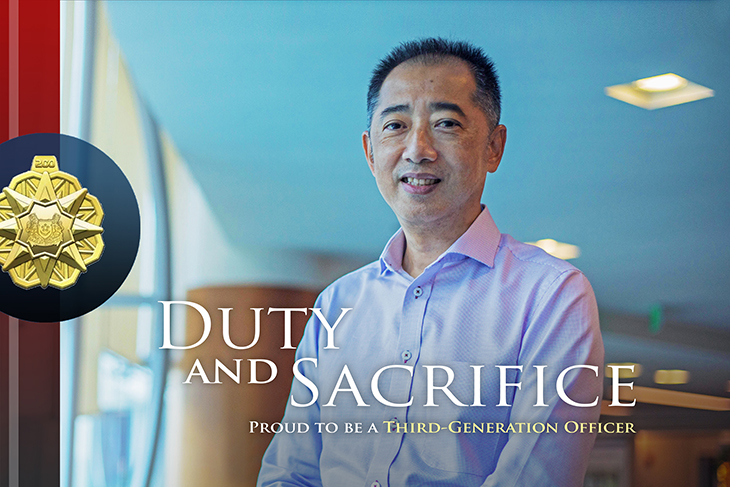
We caught up with Senior Investigation Officer Arshath Arif from the Commercial Affairs Department (CAD)’s Asset Confiscation Branch (ACB) for a glimpse of what financial crime investigation entails. But first, we test his knowledge to bust some money laundering myths and separate fact from fiction.
Myth #1: Money laundering is done through transacting high value items like artworks.

Source: Little Women, Episode 8, International Orchid Society’s Auction in Singapore
Arshath: Fact. It is possible for money laundering to occur through high-value item transactions, such as the buying and selling of artwork and antiquities. Money laundering can also occur through the purchase of properties and other luxury items. Often, criminals may route the funds through shell companies or purchase the items anonymously, making it difficult for law enforcers to trace the transaction without a proper audit trail.
Myth #2: Only large companies and corporations carry out money laundering.

Source: Vincenzo, Episode 18, Jang Han-Seok arrested for tax evasion
Arshath: Fiction. In Singapore it’s more common for money laundering to occur through shell corporations or money mules. The money mules or persons who set up the shell companies could be teenagers, young adults or even seniors enticed by the opportunity for fast cash, while some investigated are completely unaware that they are involved in illegal operations.
Myth #3: Money launderers rely only on physical cash or assets to avoid detection by authorities.

Source: Wolf of Wall Street
Arshath: Fiction. Using physical money is just one method used by money launderers, due to the lack of audit trail. However, it is cumbersome and heavy to carry around. In today’s context, criminals and syndicates are increasingly found to have used cryptocurrencies and non-fungible tokens to launder money.
Myth #4: Money laundering and violence often go hand in hand.

Source: Narcos, Season 1, Episode 2
Arshath: While I have not seen any cases of money laundering which have resulted in violence, there are cases in foreign jurisdictions featuring money mules who work for organised crime syndicates. When the money mules are stuck in this cycle of working for criminal syndicates, their refusal to cooperate could lead to violence against them.
Myth #5: Money laundering cases are not easy to investigate, especially for those involving large companies.
 Arshath:
Arshath: There are no easy investigations. The level of complexity differs based on the number of entities, bank accounts and jurisdictions involved. Some challenges faced by law enforcers include having to conduct funds tracing for multiple bank accounts and navigating different laws for cross-jurisdiction cases.
So what exactly is money laundering?
According to Arshath, it is essentially a process of making illegal funds from ill-gotten gains appear to come from legitimate sources as shown by the chart below.
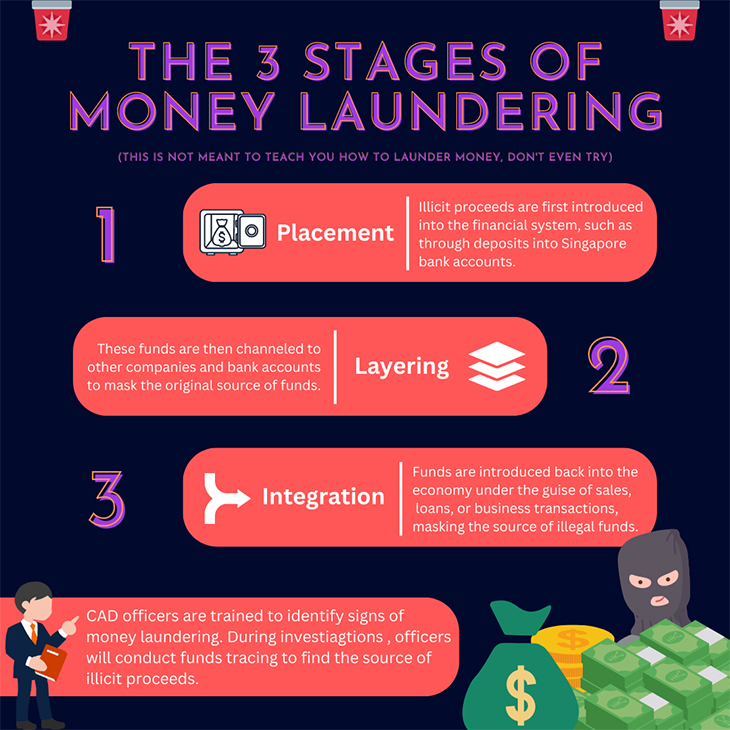
Arshath’s work requires him to identify offenders, recover proceeds of crime and gather evidence to support legal assessment of cases. Offences that fall under the purview of ACB include money laundering through the use of shell companies and money mules. He also conducts concealed income analysis to uncover unexplained wealth of suspicious individuals and entities.
Raids, recording of statements, meetings with relevant agencies and putting up investigation papers are just some his day-to-day duties as a CAD officer.
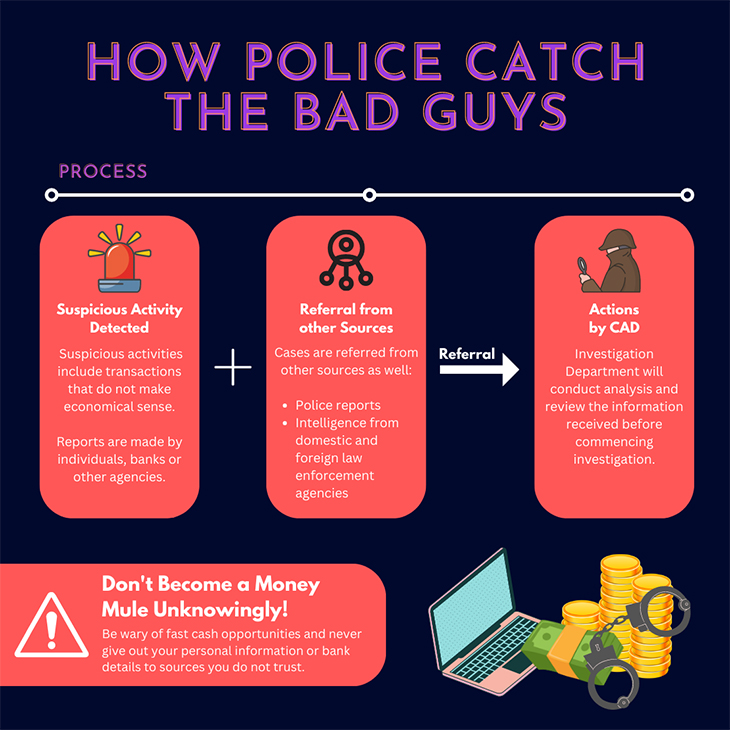 Discovering his Passion for Busting White Collar Crimes
Discovering his Passion for Busting White Collar Crimes
Arshath realised the auditing profession was not his cup of tea after completing several auditing internships as an undergraduate of
Accountancy at the Nanyang Technological University.
Instead, it was an elective in forensic accounting that exposed him to the work of CAD, igniting his interest in white-collar crimes.
This led him to join CAD where he took foundational courses such as the white-collar crime investigation course that taught him about the different types of financial crimes, interview techniques, funds tracing methods and much more.
“The learning curve is steep, and you will need to do additional reading to better understand the terms and concepts in financial crimes, but the supervisors are always there to provide guidance and advice when needed,” says Arshath.
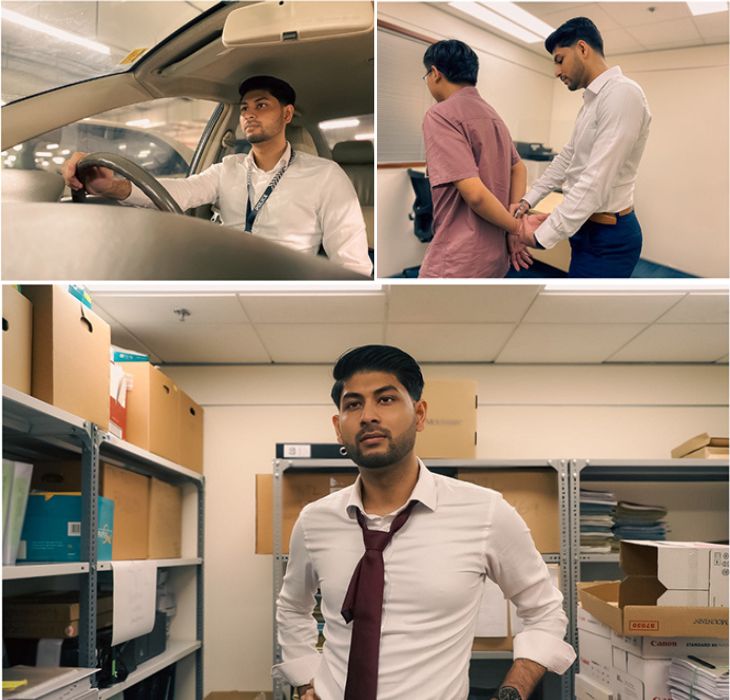
PHOTOS: Elaine Lee and Benedict Kok
“The work we do is especially important because Singapore is a major global financial hub. Preventing, detecting, and deterring financial crimes is imperative to ensure Singapore remains a secure financial centre, and to uphold our reputation on the world stage,” explained Arshath.
To cope with the demands of the job, Arshath thinks that courage is one of the most important qualities a CAD officer should possess.
“CAD officers often have to deal with uncooperative or difficult suspects who seek to intimidate. We shouldn’t bow to pressure or give up easily. Do not be afraid to ask questions, regardless of who you are dealing with,” said Arshath.
MHA Civilian Scholarship
The
MHA Civilian Scholarship is awarded to outstanding individuals who are passionate about strengthening Singapore’s security and public safety. Recipients of the MHA Civilian Scholarship may choose from a variety of exciting and rewarding Home Team careers according to their interests and aspirations. This civilian scholarship offers six career tracks: a
Generalist track and five Specialist tracks:
Intelligence; Psychology; Commercial Affairs;
Science and Technology; and
Internal Security.
Read other articles in the series
Generalist track - A Guide to Becoming a Policymaker
Intelligence track -
No Glitches in this Matrix: The Unseen Work of a Crime Analyst
Internal Security track -
Quiz: Are You Cut Out to be an ISD Officer?












